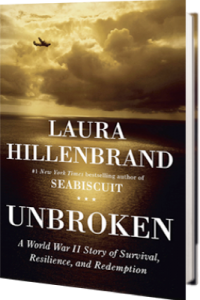
by jphilo | Jan 19, 2011 | Reviews

I usually don’t cry when nearing the end of a biography. After all, biographies are about famous people, and we already know how the story ends. But in rare cases, a life story is gripping enough and the writing brings the subject alive. In those cases, the biography’s subject becomes a beloved friend, so the reader is moved to tears when it’s time to say good-bye.
At the end of Unbroken: A World War II Story of Survival, Resilience, and Redemption, I didn’t want to say good-bye to Louis Zamperini. I’d come to love the man who’d once been an incorrigible youth, well-known to the local police department. I raced beside him when he qualified for the 1936 Berlin Olympics and rubbed my eyes when he shook hands with Hitler. I started with recognition upon hearing of his early bomber training in Sioux City, Iowa. I barely endured the pages recounting his 42 days on a life raft in the Pacific after a B-24 Bomber crash. I cringed at horrific descriptions of his treatment in a World War II vet who suffered indescribable horrors in a series of Japanese POW camps. After the war, when he became an alcoholic to blot out the POW memories, my heart ached for him. When his life changed after hearing the gospel at a Billy Graham Crusade, I rejoiced.
And when author Laura Hillenbrand (she also wrote Seabiscuit) described the optimistic ninety-two-year-old Louis Zamperini when the book was released in 2010, I began to cry. I didn’t want to leave this man, this unbroken man who forgave the Japanese prison guards who tortured him and took away his dignity.
I cried to think of all he’d suffered, all he’d taught me, and all the lives his story will change. I cried because Louis chose the better part and by his choice, has changed many lives for good. I cried to think of how this story would have been lost had not Hillenbrand begun her research while Louis, his siblings, and several of his war buddies were still alive.
If you read Unbroken, you may cry, too, when it’s time to say good-bye to a man whose true story reads like an implausible Hollywood movie script. But a good friend is worth a few tears, don’t you agree?
Go ahead.
Read the book.
Cry a little.
Be inspired.
Meet Louis Zamperini.
By the time you finish the book, I hope agree he’s worth a few of your tears.
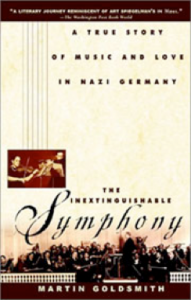
by jphilo | Feb 2, 2010 | Church Newsletter Columns

It too shall be a remnant for our God;
It shall be like a clan in Judah…
Zechariah 9: 7
For over a year now, I’ve questioned the wisdom of the Holy Spirit, who nudged me to study the book of Zechariah in depth. Zechariah, God? Are you sure? It’s too hard. I’ve got more important things to do.
I figure God’s usually too busy shaking His head at my predictable objections to bother replying. Either that or He’s chuckling at my list of suggestions about studying something else. How about something more comprehensible, like one of the gospels, or more practical, like one of Paul’s epistles?
But once in a while, God pours grace upon my skeptical head, granting a glimpse about why He encouraged my up close and personal study of a guy who died 2,500 years ago. Recently, He pulled back the veil a tiny bit to reveal His ability weave together seemingly unrelated lives and events across time and space.
The glimpse began when my friend Vicky Beer gave me a book. “I found it while we cleaned Mom’s house. It made me think of you,” she said after her mom died.
I took The Inextinguishable Symphony by Martin Goldsmith home and added it to the stack on my nightstand. It sat there for months until December when I was looking for something to read – preferably not related to special needs, writing, marketing, or Zechariah.
Goldsmith’s book filled the bill. History sprang to life as the author told the story of his parents, Jewish symphony musicians in Germany during Hitler’s rise. They met, married and emigrated to the United States on one of the last refuge ships to sail before the Nazis sealed the borders.
The parallels between Goldsmith’s book and Zechariah were striking. Over and over, the prophet repeated God’s promise to preserve a remnant from among the Jewish exiles in Babylon. He also prophesied both the triumphant arrival of the Messiah in Jerusalem and God’s plan to make other nations part of His family, too. God whispered as I read and studied. I’m working among the nations, preserving my remnant when all seems lost. I did it then. I’m doing it now. And I’m at work in your life, too.
The vast and personal reach of God’s hand is still a greater mystery to me. Why would He weave together the Babylonian exile, the atrocities of Nazi Germany, the loss of Vicky’s mom, and my Bible study to show Himself? I have no answer, just a deep conviction of God’s promise to reveal Himself when people seek Him in His word.
If you want a glimpse of God at work in your life, study His word – though you might want to start somewhere other than in Zechariah. Show up every day and read. Be patient. Wait for Him. When you least expect it and in unpredictable ways, He will simultaneously reveal Himself, become more mysterious, and grow your faith.
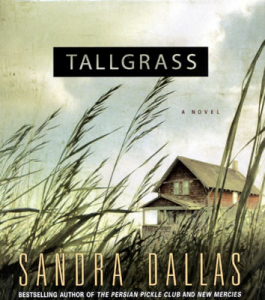
by jphilo | Sep 25, 2009 | Reviews

If you enjoy historical fiction, you’ll want to read Tallgrass by Sandra Eller. In it, she tells the story of Ellis, a rural community in Colorado’s sugar beet country. During WW II, the federal government erected Tallgrass, Japanese-American internment camp, a few miles out of town near the Stroud family’s farm.
Tallgrass is also a coming of age tale. Rennie Stroud, a precocious thirteen-year-old farm girl, narrates the action. Her innocence fades as prejudice against the Japanese-Americans increases, a classmate is violently murdered, and her mother’s health fails.
Dallas’s characters are memorable and tenderly flawed, especially Rennie and her parents. The major characters have distinctive, unmistakable voices that make them real. The townspeople are complex, doing good one moment and making fools of themselves the next. The descriptions of farm life reminded me of my mother’s stories of growing up on a Minnesota farm in the same era. And the historical details are accurate without being didactic.
If you were alive during WWII, Tallgrass will wrap you in memories. If you’re too young to remember the 1940s, let the book take you there while you read. Your grasp of an important time in our nation’s history will increase, along with your understanding of the prejudices that have long marked our country. Tallgrass is definitely worth a read.
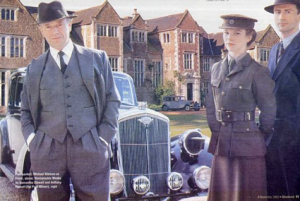
by jphilo | Feb 24, 2009 | Reviews

Last week, I checked out the first episode of Masterpiece Theater’s Foyle’s War. Ten minutes into the show, I was hooked, determined to watch every episode. I returned the first episode to the library yesterday and checked out the next three.
The woman at the circulation desk waved the DVD case in the air. “Aren’t these wonderful? We’re in the middle of season three.” Then she laughed. “Anybody who checks out one of these ends up watching the whole series.”
Last night I watched the second episode, entranced. What makes the series so good? Is it Michael Kitchen as Detective Chief Superintendent Christopher Foyle? His characterization of the detective who’s request to enlist during WWII has been denied is masterful, understated, poignant. The writers weave war news with Foyle’s work in war-weary England subtly and beautifully. They slowly build the life stories of the supporting actors into their relationship with Foyle in a way that brings me back for more. And the meticulous period costuming and the beautiful English countryside are a feast for the eyes.
If you like English mysteries, World War II and well-written, well-acted entertainment, this series is for you. Check this link for more information about the series and the order of the episodes. You’ll want to watch them in order to see the characters grow and change. Happy watching, and tell me what you think of Foyle’s War.
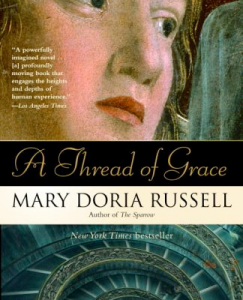
by jphilo | Jan 15, 2009 | Reviews

A Thread of Grace is one of the saddest and most hopeful books I have read in a long time. It’s a well-researched historical novel set in Italy during World War II. Mary Doria Russell chronicles the efforts of northern Italy’s village priests and peasants to hide Jews from the Nazis.
The risks taken and sacrifices made by ordinary people make for sobering and sometimes harrowing reading. The inhumanity and arrogance of the oppressors is horrifying, yet the efforts of those protecting the Jews weaves a thread of grace around the cruelty. Where did those ordinary people find strength to do good deeds in the face of such evil? Only by clinging to the thread of grace, the actions of the priest and peasants seemed to say, by emulating the sacrifice and hope of their Savior who came to earth in the form of an ordinary man.
Though their efforts often met with failure, Italians successfully hid more Jews during the war than any other nation. A Thread of Grace is a testament to the Italian citizenry in the 1930s and 40s. It contrasts sharply with a recent NPR story that detailed how the nation resents it’s present-day immigrants. The news report raised so many questions in my mind. What has happened in the last sixty years to so completely change Italy’s attitude? What has happened to grace? Can it be restored? Is our country, once a haven for immigrants and the oppressed, following the same path? If so, what can we do to stop it?
I don’t have answers after reading this book, only a greater ability to find the thread of grace that manifests itself through ordinary people during mankind’s most shameful times. Maybe this book can help you find a thread of grace, too.






